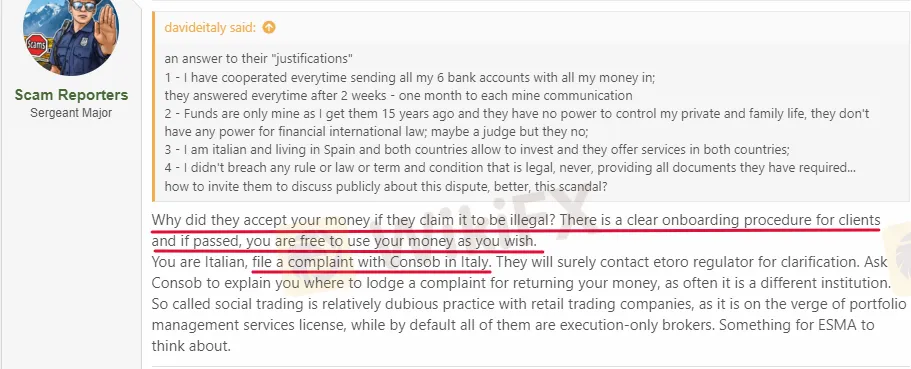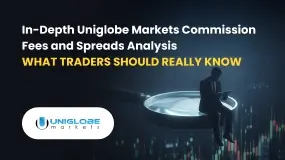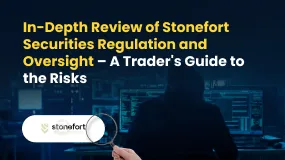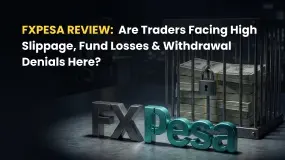简体中文
繁體中文
English
Pусский
日本語
ภาษาไทย
Tiếng Việt
Bahasa Indonesia
Español
हिन्दी
Filippiiniläinen
Français
Deutsch
Português
Türkçe
한국어
العربية
A Italian Trader's Withdrawal Declined by Etoro
Abstract:Forex trading is often associated with lucrative returns, and that's true when done carefully.

However, the market is also known for its miseries typically linked to the conduct of forex brokers and exchanges. While brokers get reported for various other problems, eToro often receives critics for its withdrawal issues.
Traders Account Blocked and Withdrawal Declined by Etoro
Here is a case reported on a forum and it says a member “DavideItaly” claimed to be scammed by eToro for €72043. While explaining the issue, the client who who is Italy and now lives in Spain disclosed that eToro blocked his access to the platform on account of suspecting illegal deposits. However, after receiving all the supporting documents and confirmation of the fund's resources, the company still seemed unwilling to unblock his account or process refunds.
Davideitaly further stated that he had complied with all the rules and regulations of the company and completed all the necessary steps required for identity verification. While depositing funds with the company, he provided a copy of his grandmother's cheque in his name, confirming both the transference of the amount and the source of funds. The firm didn't raise any concerns initially, but they launched an investigation after six months which seemed to be coming out of nowhere.

Based on his nationality, other forum members suggested that he should file his case with Commissione Nazionale per le Società e la Borsa (Consob) - the regulatory authority responsible for overseeing intermediaries operational inside Italy. However, CONBOS confirmed him that eToro doesn't fall under their territory after his resort. He was advised he can only try to escalate the issue to the major regulators across Europe and the UK, such as ESMA, CySEC and FCA. As of April 09, 2022, the client got back €24000 out of €72043. However, he wanted to have his all money refunded.

Summarizing the scenario discussed above, it is evident that eToro didn't act justifiably. If the company had suspected the client's source of investment, they shouldn't have accepted the deposits at first. Secondly, what's the point of launching an investigation after six months of registration? Third, if the company had to restrict the client's access, the client should have been asked well in advance to close off opened positions, so he doesn't suffer losses from adverse market movements. We believe had the broker been based in Italy, it could have lost its license to operate amid the validation of such accusation.
Hence, it is worth mentioning that it is not always the illegal company behind every scam, but well-regulated entities like eToro could also play unfair.
How Can You Avoid These Situations?
First of all, clients should prefer signing up with a company having regulations in their home country. For instance, if you're residing in Europe, you should always register with a company regulated by European Securities and Markets Authority (ESMA) or the Cyprus Securities and Exchange Commission (CySEC). Likewise, UK-based clients should opt for FCA regulated entities. These are the most reputable regulatory bodies across Europe & UK and can make things easier to prosecute if their regulated company breaches the code of conduct.
Secondly, clients should get their accounts verified before depositing any funds. Also, defining stop-loss for all of your positions is crucial. So even if the broker restricts your access,
your positions get automatically closed after reaching a certain level.
Lastly, read the terms and conditions carefully and understand the withdrawal policy thoroughly before signing up with any broker. If you know how the business works, you'll have fewer troubles with things like withdrawals.

Disclaimer:
The views in this article only represent the author's personal views, and do not constitute investment advice on this platform. This platform does not guarantee the accuracy, completeness and timeliness of the information in the article, and will not be liable for any loss caused by the use of or reliance on the information in the article.
Read more

In-Depth Uniglobe Markets Commission Fees and Spreads Analysis – What Traders Should Really Know
For experienced traders, the cost of execution is a critical factor in broker selection. Low spreads, fair commissions, and transparent pricing can be the difference between a profitable and a losing strategy over the long term. This has led many to scrutinize the offerings of brokers like Uniglobe Markets, which presents a tiered account structure promising competitive conditions. However, a professional evaluation demands more than a surface-level look at marketing claims. It requires a deep, data-driven analysis of the real trading costs, set against the backdrop of the broker's operational integrity and safety. This comprehensive Uniglobe Markets commission fees and spreads analysis will deconstruct the broker's pricing model, examining its account types, typical spreads, commission policies, and potential ancillary costs. Using data primarily sourced from the global broker inquiry platform WikiFX, we will provide a clear-eyed view of the Uniglobe Markets spreads commissions prici

In-Depth Review of Stonefort Securities Regulation and Oversight – A Trader's Guide to the Risks
For experienced traders, the process of selecting a new broker transcends a simple comparison of spreads and leverage. It is a meticulous due diligence exercise where the integrity of the broker's regulatory framework is paramount. Stonefort Securities, a relatively new entrant in the crowded brokerage space, presents a complex and often contradictory profile. On one hand, it boasts a modern MT5 platform and a stream of positive user testimonials. On the other hand, it is shadowed by severe regulatory warnings that question the very foundation of its operations. This in-depth review focuses on the core issue for any long-term trader: Stonefort Securities regulation and oversight. We will dissect the broker's corporate structure, scrutinize its licensing claims, and analyze what the data implies for trader protection and fund security. For traders evaluating whether Stonefort Securities is a trustworthy partner, understanding these details is not just important—it is essential.

FXPesa Review: Are Traders Facing High Slippage, Fund Losses & Withdrawal Denials?
Do FXPesa support officials fail to pick up your calls when you raise fund withdrawal requests with the broker? But are these officials always open to you regarding fund deposits? Do you frequently spot slippage and stop-loss order execution errors on the FXPesa login? These issues are increasingly becoming common with this forex broker. Consequently, many traders have expressed their dissatisfaction with the broker online. In this FXPesa Review article, we have shared some of these complaints. Take a look!

Trive Investigation: High Score, Hidden Risk - The Profit Paradox
A disturbing pattern has emerged regarding the broker Trive. Despite holding a high WikiFX score (7.91) and valid licenses in South Africa and Australia, recent investor reports suggest a significant disconnect between the platform's reputation and its treatment of profitable clients. While the regulatory paperwork appears in order, our data indicates that traders are facing sudden account freezes and accusations of "trading abuse" precisely when they attempt to withdraw profits. This report investigates why a seemingly "safe" broker is generating high-risk complaints.
WikiFX Broker
Latest News
WikiFX's New Evaluation of ATM Capital LTD: Does its License Protect the Arab Investor?
How a Fake Moomoo Ad Led to the “New Dream Voyage 5” Scam
Is Axi Legit? A Data-Driven Analysis of Its Regulatory Standing and Trader Feedback
FXPesa Review: Are Traders Facing High Slippage, Fund Losses & Withdrawal Denials?
Trive Investigation: High Score, Hidden Risk - The Profit Paradox
In-Depth Uniglobe Markets Commission Fees and Spreads Analysis – What Traders Should Really Know
Bessent believes there won't be a recession in 2026 but says some sectors are challenged
Is GGCC Legit? A Data-Driven Analysis for Experienced Traders
Young Singaporean Trader Grew USD 52 into a USD 107,700 Portfolio
In-Depth Review of INZO Trading Conditions and Product Offering – A Data-Driven Analysis
Currency Calculator




